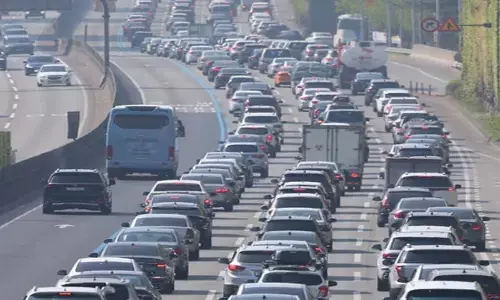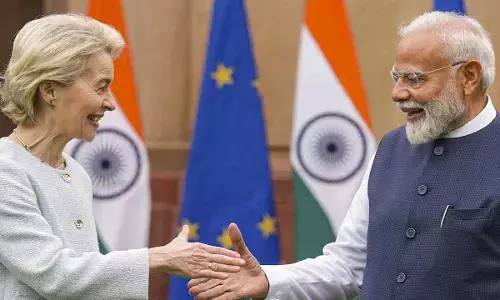MyVoice: Views of our readers 23rd May 2021

MyVoice: Views of our readers 23rd May 2021
Unwarranted tirade on India's Covid fightback
This is with reference to the Lancet editorial on India's fight against Covid published on May 8 and the resentment exposed by Pankaj Chaturvedi in the edit page of THI, dated May 20.
The popular medical journal of Lancet has made avoidable / ludicrous comments in its editorial against India with regard to the latter's way of tackling the widespread Covid-19 disease. At the outset, it seems to be out of the way in categorically asserting that there would be 1 million deaths in India due to Covid-19 by August 1.
Through the editorial, the Lancet was unwarranted to have painted India in a poor light , even as the ground realities as elucidated / analysed in the edit page article by Pankaj Chaturvedi are different / favourable in claiming a good picture of India in the aspect of containin the pandemic during and subsequent phases of its outbreak.
The Lancet has also falsely implicated the role and responsibility of the Prime Minister, Modi for national catastrophe by quoting the death toll mounting to 1 million by August 1, 2021 . The pro-British weekly of Lancet had made comments against India reminiscing the days of British colonial rule when the latter denied yielding to India's Independence.
British have always been treacherous and inimical in its stand towards India. It appears inapt and unworthy to publish a politically biased / oriented article in a medical journal which is basically devoted to health. The current situation which is laden with Covid-19 blues demands for an end game and not the blame game.
A glance at the actual statistics reveals that the USA with a population of 0.3 billion has lost 6 lakh citizens, Brazil with its 0.2 billion population has lost 15 lakh lives, UK with its population of 0.06 billion lost 1.27 lakh citizens and India with its 1.3 billion population, has lost 2.62 lakh Indians till now.
These statistics are any indication for under-reporting in the case of India. But it is anybody's guess that mortality in India is by any means hardly to reach the 1 million mark by August 1, 2021 given a larger percentage of the population expected to get vaccinated by such time that was mentioned in the Lancet journal.
It is to be mentioned in this context , that case fatality ratio (CFR) of 1.1 per cent in India is less when compared to that of US, France, Italy and Germany, besides recovery rate appearing to be remarkably the highest, thereby showing that India's progress in tackling Covid-19 cannot be undervalued. Despite 9 per cent of the total population has so far been vaccinated till now, India has shown extremely well in achieving a lower case fatality ratio which is an encouraging trend in a time frame of 4 months since vaccine drive has been initiated.
Further, India has an appreciable role in the export of HCQ and Paracetamol during the peak time of the pandemic and it also shares the magnanimity to dispatch 66 million doses of vaccine to foreign nations despite it being reeling under shortage.
The contradictory remarks made in the editorial with regard to the role of States and the federal government were uncalled for. There has been a false belief that the pandemic was getting over during the winter and hence the necessary alert with regard to tsunami like second wave was lacking among the States that were supposed to take enough health care of their subjects as underscored in the Constitution.
As mentioned in the Lancet editorial, there have been monumental lapses in controlling the spread of virus in the wake of people going unruly during political rallies in India notwithstanding the failure of the Election Commission of India in deferring the polls until the intensity of the pandemic subsided.
These lapses have led to heavy blame / criticism of the Indian government by the Editor of the Lancet who was oblivious of the extent of economic loss / damage likely in case of deferring the crucial elections so as to maintain safety by reducing the number of positive cases not otherwise feasible.
As questioned by the Lancet editor, holding up of Kumbh Mela festival which comes once in every 12 years was unavoidable in a country where religious sentiments are considered paramount even at the cost of risk to life.
A similar situation like Kumbh where people get densely populated cannot be ruled out in case of slum areas of Mumbai and Delhi , this being a regular feature in such largest and top cities of the nation.
Thus, all in all, the Lancet editorial was aimed at maligning India globally with a prejudice by projecting biased and misguided information.
Thus the British medical journal has indulged in the dubious distinction of taking on India to criticise the latter for its failure in arresting the explosive situation during the second wave of corona.
BH. Indu Sekhar, Hyderabad
Directionless Congress
Today Congress is a party without cadre and saddled with a listless leadership. Unless the Gandhis vacate their positions at the top, fresh blood and ideas won't flow to the party and it won't be seen as a serious player in the national politics.
Can its soul searching begin now,at least? For the Congress and its leader Rahul Gandhi the election results is a grim reminder that they have no viable politics at the moment.and Mr Gandhi has to rethink his freelancing, footloose politics and the verdicts are no indication that a national-level alternative is in the making and it is still some distance away in time and effort.
It is expected that Congress should lead in the formation of such kind of opposition parties front.Congress should also take care of rumbling in party in Panjab and The Party can revive the practice of annual sessions inviting mass leaders from across the country to preside over those meetings and very positive affect will go at grassroot level.
It is evident that Sonia will not have anyone other than Rahul as Congress president and Rahul does not want to become the party president and nor has he publically nominated the party president and this conundrum merits a solution.
It is a well known fact that in politics as in life the easiest solution often does not exist.The party should enlarge its footprint by bringing in new ideas,new talent and most importantly greater national participation of bigger crown-pullers .as crowds and compaigners change the mood of the public.
Yash Pal Ralhan, Jalandhar
Human behaviour and Covid spread
The write-up by V Ramu Sarma outlining that local administration in coordination with village heads in the two Telugu states and in adjoining Maharashtra joining together and taking a lead to ensure that none is affected by the virus is a classic example that with a bottom-up approach striving to bring awareness to all the inhabitants of the villages so that they could be able to meet the challenges and achieve creditable success in preventing the virus entering the villages is an eye-opener to all villages across the country to adopt the model in order to be free from the dreaded virus which turned brutal during the second wave.
However during testing times, as the thinking of people of inhabitants in all villages across the country may not be uniform with many of them of the firm belief that Covid is mainly restricted to the urban areas and that they are immune due to healthy life style coupled with good eating habits, they care less to listen and adopt the best methods. As a result most of the villagers are still suffering due to lack of medicare and treatment.
The lethargic and indifferent local administration only added to their woes by implicitly accepting the villagers' version by not bothering to put in any efforts to educate and bring awareness in them to follow covid appropriate behaviour strictly. This has resulted that many were caught unawares.
Even then resistance among villagers still continues. To remove this wrong perception, there is urgent need for a fact based communication drive to inform illiterate and semi-literate population in rural India by adopting altogether a different approach to make them understand and see reason that vaccination is the only long-term sustainable solution to combat the pandemic.
Thus the fact remains that human behaviour is a crucial for its faster spread and with rural India in particular been complex with unique behaviour norms needs an innovative approach by the local administration to deal with the Covid pandemic.
As things stand, the only way to overcome the obstacles is not to sit and watch but to remove the misconception among inhabitants of the hinterland with evidence based data by the administration by framing an effective strategy for both urban and rural by taking into account their needs in order to overcome the shortcomings and pitfalls so that they come out of the present grim situation sooner and also be able to avert crisis in future by taking timely action.
In short, the government and political class must end all bickerings and continue to work tirelessly with a resolve to prevent panic among people by lessening their sufferings at a time when Covid crisis rages on leaving none.
K R Srinivasan, Secunderabad
Ayurveda needs to be promoted aggressively
With the huge demand for the Ayurvedic medicine invented by Anandayya at Krishnapattanam, it's time now , for both State and Central governments to give equal status and importance to the Ayurvedic sector as is being given to the Pharmaceutical sector.
India is the birth place of Ayurveda and great saints and rishis researched in depth and provided several medicines to cure many diseases. Unfortunately, with the evolution of drug and chemical oriented pharmaceutical medicines from western countries, the encouragement to the Ayurvedic sector been sliced. Government is encouraging pharma sector by gifting huge areas of lands, recognising them as SEZs, reducing export duties, establishing research centres, labs etc. When comes to Ayurvedic sector, there's no such encouragement and interest.
Indian climatic conditions suit well for the growth of several plants and trees which produce key ingredients to various Ayurvedic medicines. People believe in Ayurveda and as such we are witnessing huge crowds of Asthma patients for fish medicine at Hyderabad since long and for corona medicine at Krishnapattanam now.
The government, in public interest, should consider Ayurveda as a key sector and encourage it by establishing more research centres, and by allocating lands to grow the trees required for manufacturing Ayurvedic medicines. Also, it should see to it that basics of Ayurveda be included in the syllabus from school level.
T Sri Kumar, Hyderabad
Despicable promos
Self-promotion by politicians has reached ridiculous levels, as the vaccination certificate issued by GOI carries a photograph of PM Modi. Now Congress-ruled states Jharkhand and Chhattisgarh have replaced the PM's photo with their CMs as the cost of vaccination is being borne by the states and not by the central government.
Politicians of the country have earned disgrace of Indian masses due to governments' indifference and neglect to health care infrastructure which have put the masses lives in quandary .In reality, the cost of vaccine is borne by taxpayers only .So, vaccination certificates should mention boldly, 'Vaccination cost borne by Indian Taxpayers'.
Brij B Goyal, Ludhiana
Calm before the storm?
It is undoubtedly relieving to see that the ongoing conflict between Hamas and Israel in Gaza has came to an end, after eleven days of raining missiles from both sides that took the toll of countless human lives on either side. There can be no victor in a human tragedy, in the event of an aggression.
Nonetheless, mindless and irrational moves by a terror group must be meaningfully answered and tackled, and Israel proved the winner in this regard despite taking up on the constant barrage of missiles and rockets that were rained on it by the Palestines.
But for the effective missile shield at the disposal of Israel that could see the majority of rockets being rendered ineffective by an efficient anti-missile system, the country would have suffered a mammoth destruction and loss of lives of its citizens. Yet the country had witnessed the loss of lives, including an Indian, who was working there for the past seven or more years, hailing from Kerala – Soumiya Santosh.
Israel took the decision of destroying the houses of the Hamas leaders and the headquarters that included the building of a popular Arab channel – Aljazeera for the malicious and one sided propaganda against Israel.
The Israeli action had two dynamics; in rooting out the Hamas tendency for rocket attacks on the human habitations in the country, and to mop up the Islamist leadership of Hamas, responsible for planning such deadly and diabolic attacks.
As the editorial prudently acknowledges there is guarantee in future that there will be no similar war between Israel and Hamas as both parties have been through such wars in the past. But, the recent missile attack was a brutal and coldblooded one by Hamas.
K R Parvathy, Mysuru
Sunderlal Bahuguna will always remain one of his kind
My mind was distressed after hearing the sad news about the sudden death of S Bahuguna. The distinguished conservationist and Chipko movement organizer Sunderlal Bahuguna had capitulated to the pandemic's iron sway on 21st May. His sudden death caused void in the field of conservation.
In India, the Chipko Movement ushered in modern environmentalism that began in 1973. Yet the political parties and politicians of the day had neither the required perspective nor much sensitivity when it came to the mountains.
Over the decades after Independence, the resources of Uttarakhand were continuously pillaged by influential external interests is a known irony. As for the region's natural wealth, it seemed under an uninterrupted nuisance to be plundered and overexploited.
Its trees were taken away, its resin sold, its herbs and minerals exported; its wild animals exterminated discreetly. Even the rivers of Uttarakhand, which through landslides constantly scarred and cut the mountains, seemed created only to take water and fecundity down to the plains. It was neither human nor a gift of nature – such as metal, stone, and wooden statues in the region's historic and neglected temples were too seemed predestined to be smuggled.
The process of creating a people's movement could not have emerged out of the interests and motivations of politicians for a long time. More compassionate were Sarvodaya activists who had been largely trained in the Bhoodan-Gramdan school of Vinoba Bhave.
Even if Uttarakhand is famous for landlords, the idea of 'bhoodan' was of limited consequence. However, Sarvodaya workers had over their extensive conversations acquired a deeper indulgent of the local society and its challenges. They had seen that the main problems of the people pertained to land, forests, and natural resources.
The villagers of Uttarakhand had put forth their forest-related problems in great detail to the Fact Finding Committee of 1959. Yet this had had absolutely no impact on policy. Instead, after 1960, the expansion of the road network had made it easier to cut and carry away trees previously out-of-the-way. The extraction of timber, resin, and other commercial forest produce had expanded in haste.
The idea of Chipko was along with several byways loomed internally. A year later, on 22 October 1971, an even bigger demonstration was held in Gopeshwar, where it was clearly stated that "we have first right over raw material from the forest for our livelihood" and "we will no longer tolerate willful ransack". Ending the contractor system, giving rights to forest dwellers, and stopping the bias against small resin units were the other demands.
The two notable features of this demonstration were the participation of women and the turning out together on the streets of artisans, trades-people, and upper castes. The protests had no effect on the government and the Forest Department. The rates of resin and the quota for co-operative organizations remained unchanged.
In order to make the forest development programmes successful, the first requirement is to make fundamental changes in the existing forest policy. The existing policy stresses things such as earning as much money as possible from the forests. Due to this, the contractors have gained importance rather than the people living in the forests. The largest employment opportunities exist in forest-based industries. En route, they halted for the night at Rudraprayag, where Sailani wrote a poem exhorting his brethren to rise up and protect the forests from destruction.
The forests were looted to make capitalists rich, while the young boys and men of the mountains were forced to seek employment as dish-washing menials in the plains. Everybody was chase for felling forests but no one was planting trees to replace them. If forest-based industries were initiated locally, they might bring socialism to the mountains.
Raju Kolluru, Kakinada














